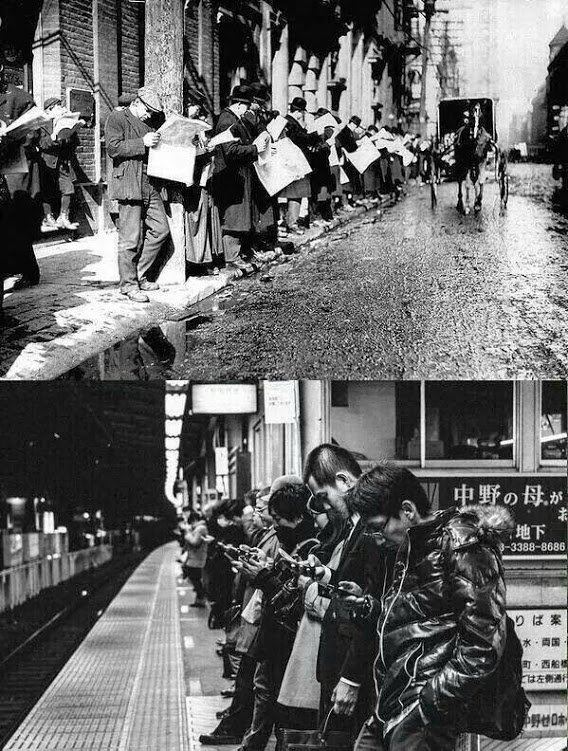Like the title ?
I liked the bit that says that Android changes could save 1 million lives over the next 10 years by doing something about driver distractio.
Jakob Nielsen, "Mobile Usability Futures" | Talks at Google
Very little about Mobility but a good talk otherwise.
Friday, September 26, 2014
Thursday, September 25, 2014
Talks University of Glasgow :: School of Computing Science :: Events :: Event Item
Here is a link to a talk I will be doing in Glasgow soon.
University of Glasgow :: School of Computing Science :: Events :: Event Item
University of Glasgow :: School of Computing Science :: Events :: Event Item
Our isolated lives
The nightmare which is known as CHI now over. I've been recovering and thinking about what to do next. Naturally it's easy to start looking at all the negatives of technology and wondering what can be done about them.
One of the things that struck me was how isolating modern technology makes us. We no longer stand at the bus stop and potentially strike up a conversation with the familiar co-traveler. I regularly sit on the train and just stare at the laptop Along with most of my fellow passengers. It seems that modern technology that seems to that promised how much we would be connected seems to be disconnecting us from each other.
Cultural analyst Sherry Turtle is very good TED talk about this.
http://www.ted.com/talks/sherry_turkle_alone_together?language=en
Then is see this ...
One of the things that struck me was how isolating modern technology makes us. We no longer stand at the bus stop and potentially strike up a conversation with the familiar co-traveler. I regularly sit on the train and just stare at the laptop Along with most of my fellow passengers. It seems that modern technology that seems to that promised how much we would be connected seems to be disconnecting us from each other.
Cultural analyst Sherry Turtle is very good TED talk about this.
http://www.ted.com/talks/sherry_turkle_alone_together?language=en
Then is see this ...
and I think ho - hum.
Tuesday, September 23, 2014
Tuesday, September 16, 2014
Chi paper
Another intensive weekend working on the paper played very enjoyable by having Paul come up to visit and work.
Monday, September 15, 2014
Alan Kay at OOPSLA 1997 - The computer revolution hasnt happened yet
Cool talk - IT could so wonderfully offend some of my more numerate compuationalist colleges at open Universirty.
Love the bit about Euler and the tape as self format.
Wednesday, September 10, 2014
A moments pause to reflect on the meaning of HCI.
I was talking to a college at the OU who is best described as that irritating bit of sand which a clam swallows to generate a Perl.
We got on to the problem of what makes HCI different from general design. I said that it was partly the level of degree between the kinds of complexity a physical product can have against the complexity a digital product affords.
We got on to the problem of what makes HCI different from general design. I said that it was partly the level of degree between the kinds of complexity a physical product can have against the complexity a digital product affords.
Being from a philosophical background (I think) he said he would not accept anything without a clear categorical difference. I then said, that most physical products are based on physics, we can intuitively predict them using our knowledge of the real world. Where computing gets different is that the affordances are from logic, mathematics and sometimes probability – things people are generally bad at. We agreed you could skip over all products where the computer was just the more complex way of doing a physical or electrical thing. If you press a button and the light goes on even if a computer is doing all the work it’s not ‘computing’ in the sense we agreed to mean it.
While I still think that complexity is an issue, the kinds of mental models we can build up for truly digital products is different (bigger) for other products. The notion of physical, mental models vs logic, mental models is curious.
If I wasn’t busy with chi deadline, I might do some research. The one thing which worries me is, if I start doing tangible interaction have I left HCI research?
( must work on CHI papers , must work on CHI paper )
Wednesday, September 3, 2014
Experience Mapping
Interesting article on a interaction technique ( more representaion) I didn't know about.
Now I must get back to paper writing.
Subscribe to:
Comments (Atom)




